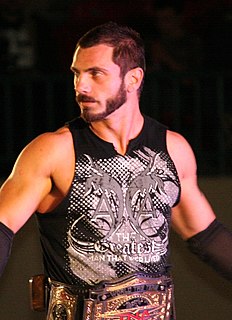A Quote by Anthony Bourdain
Oh yes, there's lots of great food in America. But the fast food is about as destructive and evil as it gets. It celebrates a mentality of sloth, convenience, and a cheerful embrace of food we know is hurting us.
Related Quotes
I think America's food culture is embedded in fast-food culture. And the real question that we have is: How are we going to teach slow-food values in a fast-food world? Of course, it's very, very difficult to do, especially when children have grown up eating fast food and the values that go with that.
Those of us who think about what we eat, how it's grown, those of us who care about the environmental impact of food - we've been educated by fabulous books, like Fast Food Nation and documentaries like Food Inc. But despite these and other great projects that shine a critical light on the topic, every year the food industry spends literally tens of millions of dollars to shape the public conversation about our food system.
Isn't food important? Why not "universal food coverage"? If politicians and employers had guaranteed us "free" food 50 years ago, today Democrats would be wailing about the "food crisis" in America, and you'd be on the phone with your food care provider arguing about whether or not a Reuben sandwich with fries was covered under your plan.
I think Americas food culture is embedded in fast-food culture. And the real question that we have is: How are we going to teach slow-food values in a fast-food world? Of course, its very, very difficult to do, especially when children have grown up eating fast food and the values that go with that.
If there was ever a food that had politics behind it, it is soul food. Soul food became a symbol of the black power movement in the late 1960s. Chef Marcus Samuelsson, with his soul food restaurant Red Rooster in Harlem, is very clear about what soul food represents. It is a food of memory, a food of labor.
One of the problems is that the US government supports unhealthy food and does very little to support healthy food. I mean, we subsidize high fructose corn syrup. We subsidize hydrogenated corn oil. We do not subsidize organic food. We subsidize four crops that are the building blocks of fast food. And you also have to work on access. We have food deserts in our cities. We know that the distance you live from a supplier of fresh produce is one of the best predictors of your health.
I think food trucks are the new answer to American fast food. The idea of raising two or three million dollars and going through red tape to open a restaurant, there's lots of barriers to success. There's a really easy jumping place for food trucks. It's very hip and acceptable for new chefs to open a food truck first.
I didn't have money to eat when I was 21. When I was short on cash, I would sometimes scam food from fast food places. I'd go into fast food chains and pretend I was from a movie studio, tell them they didn't send us the right order and demand they fix it. I've tried to make that right whenever I could.

































